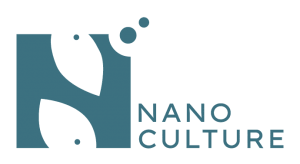Welcome to the NANOCULTURE project newsletter
#2 JUNE 2021
NANOCULTURE
Risk assessment and mitigation of the presence of engineered NANOmaterials in Atlantic aquaCULTURE
NANOCULTURE aims to provide knowledge (and tools) on the presence and effects of the most-used nanoparticles (TiO2 and Ag) in common Atlantic Area aquaculture products (turbot, mussels, seaweed); and will assess the human risk of exposure by oral intake of these products.
Previous events
Webinars: Nanoparticles in aquaculture: is it something to worry about?
Date: 16th and 18th February 2021
In February, the NANOCULTURE partners organized the second edition of the project Webinars. The event, entitled Nanoparticles in aquaculture: is it something to worry about?, was divided into one French-speaking session and one Portuguese speaking session. The participants of the online streaming sessions, which numbered close to 100 people, came from distinct domains, including not only academic researchers and professionals from the aquaculture industry, retail or regulatory entities but also the general public.
The opening speakers for the sessions were Dr. Marie-Hélène Ropers, a Research Scientist at the French National Institute for Agriculture, Food, and Environment, INRAE and Dr. Narcisa Bandarra, Head of Aquaculture and Upgrading Division at the Portuguese Institute of Sea and Atmosphere (IPMA). The video recordings of all project webinars are available at the NANOCULTURE website and at the youtube channel of the project.


Conference participations

Aquaculture Europe 2020
12th-15th April 2021
Aquaculture Europe 2020 (AE2020) is an annual event organized by the European Aquaculture Society. This online event gathered scientists and exhibitors in a virtual “e-market”. Close to 500 communications were divided into 18 sessions covering interesting and diverse topics including nutrition, fish welfare, product quality, among many others. The NANOCULTURE consortium participated in this event with three communications in the sessions “Product Quality, Value and Markets” and “Genomic Research, Tools and Applications”, and presented some of the latest results achieved in the project related with proteomics and effects of nanoparticles in turbot.
The Aquaculture Europe upcoming event will take place in Madeira between 4th and 7th October and will also count on the participation of the NANOCULTURE team!

EuroNanoForum 2021
5th-6th May 2021
The EuroNanoForum is Europe’s largest networking conference focusing on nanotechnologies and advanced materials science, innovation and business. This event was organized by NANOCULTURE coordinator INL. The 2021 edition conference had the support of the European Commission, the Nanotechnology Industries Association, the Portuguese Science and Technology Foundation (FCT) and the Portuguese Innovation Agency (ANI). The conference gathered a total of 3640 participants from over 140 countries. The participants attended the presentations of renowned plenary speakers and several hours of sessions about distinct nanotechnology related topics, namely Climate, environment and natural resources, Health and wellbeing and Market access of nanomaterials, regulations, standards and characterization among others.
NANOCULTURE partner
In each NANOCULTURE newsletter, we will introduce you to one of the project partners. In this edition, the chosen partner is INL, the International Iberian Nanotechnology Laboratory. 
INL is a leading research and advanced training institution on nanotechnology innovation.
INL is well equipped with cutting edge equipment in its facilities located in Braga, Portugal. The INL resources include cleanrooms, advanced microscopy and spectroscopy, X-ray diffraction and scattering techniques, photonics and bioimaging and magnetic resonance imaging, among many others. The INL has more than 330 staff and researchers from over 30 different nationalities that work on over 200 national and international projects.
Dr. Begoña Espiña from the INL is responsible for the coordination of the NANOCULTURE project. She is the Leader of the Water quality group within the Department of Life Sciences. Dr. Espiña focuses her research on developing portable and remote biosensors and devices based on nanomaterials for the selective capture of water chemical contaminants as well as developing methods for nanomaterials’ fate, bioaccumulation and toxicity with special emphasis in implementing the safety-by-design concept.
You can find more information about INL at the institution website and promotional video.
NANOCULTURE achievements
Portable sensors for nanoparticle detection

Interaction of the silver nanoparticles with SERS substrate (indicated by yellow arrows) developed recently by NANOCULTURE consortium.
NANO news

EFSA: Titanium dioxide unsafe for food additives
Recently, the European Food Safety Agency (EFSA) has updated its safety assessment of the food additive titanium dioxide (E171), following a request by the European Commission. The EFSA expert Panel on Food Additives and Flavourings (FAF) concluded that titanium dioxide can no longer be considered a safe food additive. Scientific studies and data revealed genotoxicity and accumulation along time in the body of consumers are the main concerns of the Panel. The safe level for daily intake of titanium dioxide as a food additive cannot be established and there is a high level of uncertainty on the composition of the materials used in this type of food additive. Titanium Dioxide nanoparticles are present in E171. These nanoparticles are one of the targeted nanomaterials studied by NANOCULTURE. Relevant information on exposure levels, and biological effects of these particles to commercial aquaculture species, and also consumers, are aimed by the project.
Upcoming events
Due to current COVID-19 pandemic situation, many conferences and events are being postponed or are going partially or fully online. See below our suggestions and updates on the main events for 2021.
Aquaculture America 2021
August 11-14, 2021. Texas (USA)
https://www.was.org/meeting/
SEAFOOD EXPO (Traders‘ Fair)
September 7-9, 2021. Barcelona (Spain)
https://www.seafoodexpo.com/
NANOMEET2021
September 13-15, 2021. Porto (Portugal)
https://www.albedomeetings.
AQUACULTURE EUROPE 2021
October 4-7, 2021, Funchal, Madeira (Portugal)
https://aquaeas.org/Meeting/
SETAC North America
November 14-18, 2021. Portland (USA)




